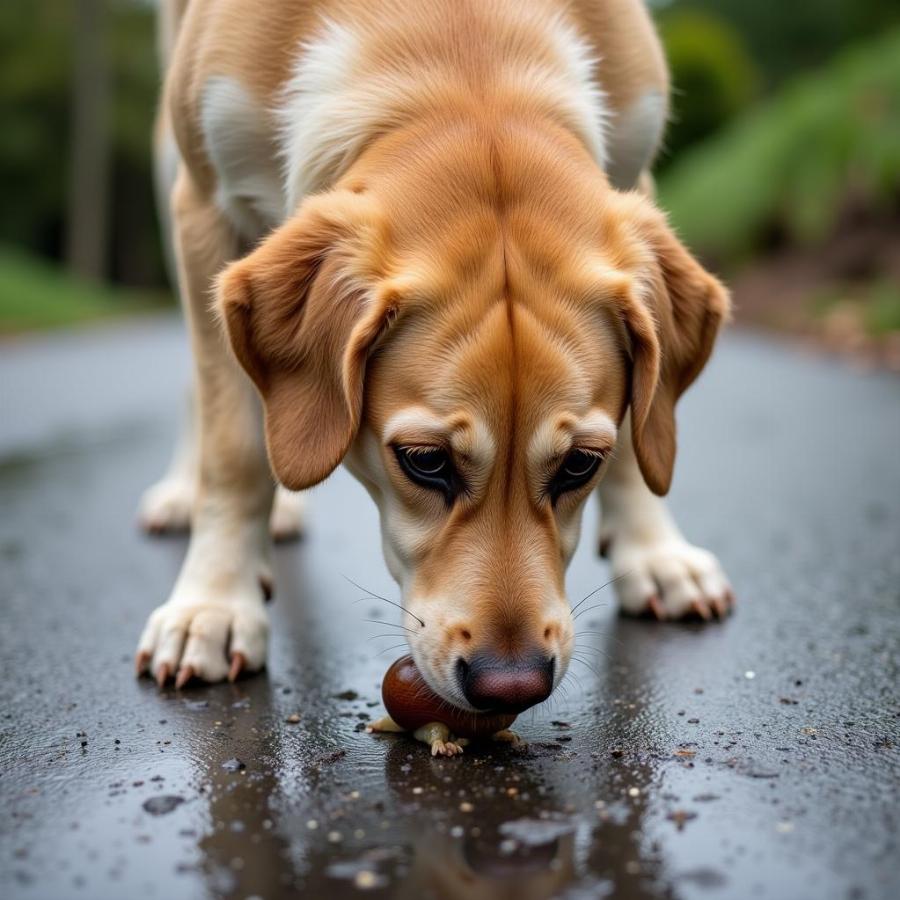If your dog ate a slug, you’re probably worried. This is a common concern among dog owners, and understandably so. This article will delve into everything you need to know about dogs and slugs, from the potential risks to what you should do if your furry friend decides to snack on one of these slimy creatures. We’ll cover symptoms, treatment, prevention, and more, empowering you to keep your canine companion safe and healthy.
Understanding the Risks of a Dog Eating a Slug
 Chó ăn ốc sên: Nguy hiểm tiềm ẩn
Chó ăn ốc sên: Nguy hiểm tiềm ẩn
While most common garden slugs aren’t inherently toxic to dogs, they can carry lungworm parasites. Lungworm, or Angiostrongylus vasorum, is a serious concern that can cause significant health problems in dogs, including breathing difficulties, coughing, and even bleeding disorders. This parasite lives in the slug’s heart and lungs, and when a dog ingests an infected slug (or even its slime), the lungworm larvae can migrate to the dog’s lungs and heart, causing a range of health issues.
Symptoms of Lungworm in Dogs
If your dog ate a slug, be on the lookout for these potential symptoms of lungworm infection:
- Coughing: This is often the first and most noticeable sign.
- Breathing difficulties: Your dog may seem short of breath or pant excessively.
- Lethargy: A lack of energy and unwillingness to play.
- Poor blood clotting: This can lead to excessive bleeding from minor injuries.
- Weight loss: Even with a normal appetite.
- Vomiting and diarrhea: Less common but possible symptoms.
It’s crucial to remember that these symptoms can also indicate other health issues. If your dog displays any of these signs, consult a veterinarian immediately.
What to Do if Your Dog Eats a Slug
Don’t panic, but do act quickly. If you witness your dog eating a slug, contact your veterinarian as soon as possible. They can perform tests to diagnose a lungworm infection and recommend appropriate treatment. Early diagnosis and treatment are key to a successful recovery. Don’t try home remedies; always seek professional veterinary advice.
Preventing Slug Consumption in Dogs
Preventing your dog from eating slugs is the best way to protect them from lungworm. Here are some effective preventive measures:
- Supervise your dog in the garden: Keep a close eye on your dog, especially in areas where slugs are common.
- Regularly clear your yard of slugs: This reduces the risk of exposure.
- Train your dog a “leave it” command: This can be invaluable in preventing them from picking up slugs and other potentially harmful items.
- Consider preventative medication: Talk to your vet about monthly preventative treatments for lungworm.
Are All Slugs Dangerous to Dogs?
Not all slugs carry lungworm, but it’s impossible to tell which ones do just by looking. It’s safer to assume all slugs are potential carriers and prevent your dog from eating them.
Can Dogs Eat Other Garden Pests?
While slugs present a specific risk due to lungworm, other garden pests can also be harmful to dogs. Avoid letting your dog eat snails, insects, and unknown plants. If your dog ingests something unusual, contact your veterinarian. dog ate moldy bread Moldy food can be particularly dangerous.
Long-Term Effects of Lungworm in Dogs
If left untreated, lungworm can lead to serious long-term health complications, including chronic respiratory problems, heart damage, and even death. symptoms of dog eating slugs
Expert Insights
Dr. Emily Carter, a renowned veterinary parasitologist, emphasizes, “Preventing lungworm is far easier than treating it. Regular preventative medication is highly recommended, especially for dogs who spend time outdoors.”
Similarly, Dr. David Miller, a seasoned veterinarian with over 20 years of experience, adds, “Early detection and treatment are critical for a positive outcome. If you suspect your dog has lungworm, don’t delay seeking veterinary care.”
Conclusion
Dog eating a slug isn’t just a yucky thought; it’s a potential health hazard. By understanding the risks, recognizing the symptoms, and taking preventative measures, you can safeguard your beloved pet from the dangers of lungworm and other slug-related health issues.
FAQ
- What is the most common sign of lungworm in dogs? Coughing is usually the first noticeable symptom.
- How is lungworm diagnosed? Your vet will perform blood tests and may examine fecal samples.
- Is there a preventative treatment for lungworm? Yes, monthly preventative medications are available.
- Can lungworm be fatal? Yes, if left untreated, lungworm can be life-threatening.
- How can I keep my dog from eating slugs? Supervise your dog outdoors, regularly clear your yard of slugs, and train your dog a “leave it” command.
- Are all slugs carriers of lungworm? No, but it’s impossible to tell which slugs carry the parasite, so it’s best to prevent your dog from eating any slugs.
- What should I do if my dog eats a slug? Contact your veterinarian immediately.
Other Questions You Might Have
You may also be interested in learning about is charcoal bad for dogs or how to keep dogs away from your yard.
Beaut Dogs: Your Guide to Canine Care
Beaut Dogs is your one-stop resource for everything related to dog care. We provide comprehensive information on various dog breeds, health, nutrition, training, and more. When you need support, contact Email: [email protected] to get detailed and accurate answers from Beaut Dogs. Visit us at https://beautdogs.com today to explore the wonderful world of dogs and learn how to care for them best!